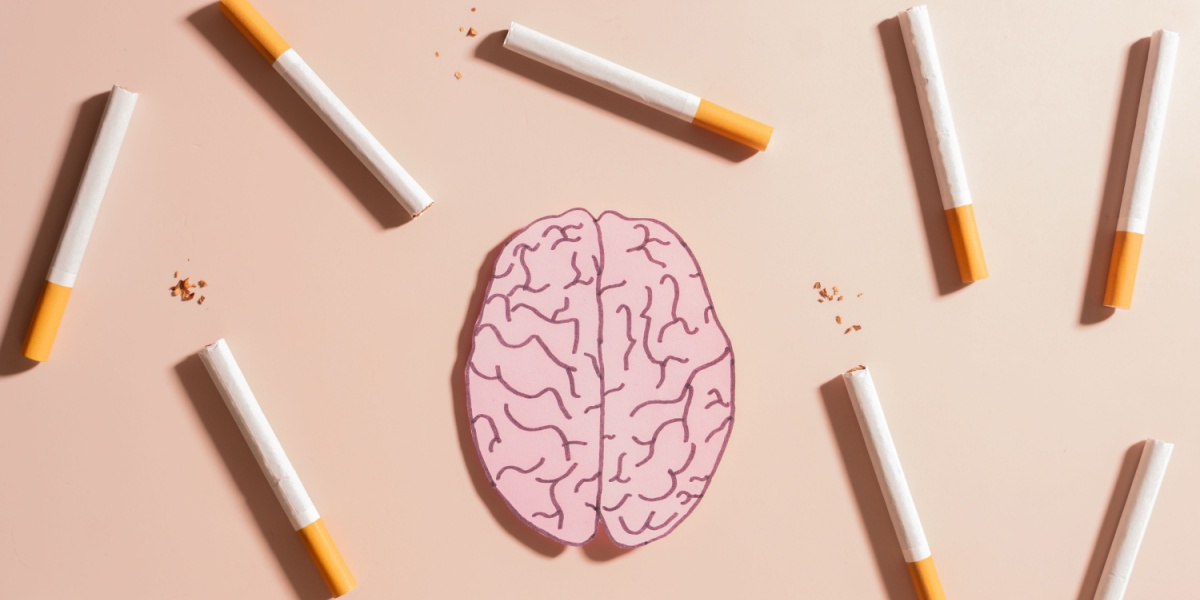Tobacco use remains a major public health issue in the U.S., with nearly 20% of adults reporting use. [1] Smoking is especially common among people with psychiatric conditions, as they are more likely to start young, smoke heavily, and have difficulty quitting. [2]
Research shows that nicotine’s cognitive-enhancing effects, particularly on attention and memory, may contribute to both the development and persistence of tobacco use disorder, especially in people with pre-existing cognitive impairments. [2]
- Nicotine activates nicotinic receptors and boosts dopamine in the brain’s reward centers, driving addiction.
- Short-term nicotine use can enhance attention and alertness, but chronic use leads to neural adaptations and cognitive deficits.
- Adolescents are particularly vulnerable: the developing brain (especially the prefrontal cortex) is more sensitive to nicotine’s disruptive effects.

Nicotine's mechanism of action in the brain
Nicotine works by mimicking a natural chemical in the brain called acetylcholine. It binds to specific receptors (called nicotinic acetylcholine receptors) in areas involved in attention, memory, and reward. These receptors are found on dopamine-producing neurons, especially in the brain’s reward system. When nicotine binds to these receptors, it triggers the release of dopamine, creating feelings of pleasure and reinforcing the urge to keep using it. [3]
With repeated use, the brain adapts. It changes the number and sensitivity of these receptors, which can make quitting harder over time, reinforcing smoking or vaping behavior. [2] Nicotine also affects other brain areas, including the prefrontal cortex and hippocampus, regions that help regulate decision-making, memory, and emotional control. [2][3]
For example, long-term smoking can lead to increased anxiety, mood disturbances, and a cycle of dependence. While nicotine may provide temporary relief from stress and even subjectively enhance cognition, it can also activate stress responses in the body, ultimately exacerbating anxiety and depression. [2][3][4]
Dual effects: Stimulation and relaxation
Nicotine can have seemingly opposite effects on the brain. Some people feel more alert and focused after using it, while others say it helps them relax. Both responses are real; they come from how nicotine interacts with different brain systems.
At low to moderate doses, nicotine stimulates the release of dopamine and norepinephrine, which can improve attention, reaction time, and even fine motor skills. [2] This is why many smokers report that nicotine helps them concentrate.
However, a release of dopamine can create a sense of reduced stress, mainly by relieving nicotine withdrawal symptoms, such as:
- Irritability
- Anxiety
- Restlessness
- Trouble concentrating
These symptoms can appear within hours of the last cigarette or vape and oftentimes drive continued use. [3]
These dual effects depend on the dose, timing, and individual sensitivity. For many people who use nicotine, it may feel helpful in the short term, even as it leads to long-term dependence.
Cognitive effects of nicotine: Long-term changes to brain chemistry
Nicotine affects how the brain processes information, but its cognitive effects are not simple. At low doses, nicotine enhances attention, working memory, and fine motor performance, particularly in people with pre-existing cognitive deficits. These benefits are well-documented in animal models and human studies. [2]
More recent findings, however, complicate that picture. In this clinical study, nonsmokers who were given 2 mg of nicotine performed better on cognitive tests, while those given 4 mg performed worse than the low-dose and placebo groups. [5] Chronic smokers, meanwhile, performed worse than all other groups on every task.
These results suggest that nicotine’s cognitive effects follow an inverted-U pattern. This means that small amounts of nicotine may enhance performance, but higher doses or long-term use can lead to impairment. [5]
Nicotine withdrawal can also disrupt cognitive function, leading to problems with attention, memory, and emotional regulation. This disruption may help explain why people relapse—poor cognitive performance during withdrawal has been shown to predict lower quit success. [2]
The evidence then suggests that nicotine’s impact on cognition is highly dependent on dose, individual vulnerability, and use history.
Is there a difference in effects between smoking and vaping?
Smoking and vaping deliver nicotine to the brain, where it binds to nicotinic acetylcholine receptors and activates the same reward and attention pathways. [6] While vaping may expose users to fewer toxic chemicals than cigarettes, the neurological effects of nicotine are largely the same.
Brain imaging studies show that regular e-cigarette use can alter activity in brain regions involved in addiction and cognitive control, including the prefrontal cortex and limbic system. [7] These are the same regions affected by long-term cigarette smoking.
Because vaping is common among adolescents, nicotine exposure during brain development remains a significant concern, regardless of how it’s delivered.
Effects on teens and the developing brain
- Adolescence is a critical window for brain development. The prefrontal cortex is a central region of consideration. It is responsible for impulse control, decision-making, and attention, and the brain continues maturing into the mid-20s. [8][9]
- Nicotine disrupts the cholinergic signaling that guides this maturation. Research has identified it as a neuroteratogen, a substance that can interfere with normal brain development, causing long-term effects when exposure happens during critical growth stages. [8][9]
- Teens who use nicotine are more likely to develop attention deficits and may be at increased risk for later psychiatric conditions, including anxiety and depression. [9]
- Nearly 90% of adult smokers began before age 18, highlighting how early exposure increases the likelihood of long-term nicotine dependence. [8]
Brain changes during nicotine withdrawal
When a nicotine-dependent person stops using nicotine, the brain has to adjust. During early nicotine withdrawal, levels of dopamine and other neurotransmitters drop, which can lead to neurocognitive effects: [10]
- Changes in mood, focus, and mental clarity
- Feeling foggy, distracted, or restless
- Deficits in attention, working memory, and impulse control
These symptoms often emerge within hours of quitting and can last for days or weeks. For some, these cognitive disruptions constitute a significant barrier to quitting. [10] Brain changes caused by nicotine withdrawal are generally not permanent and can be reversed after quitting.
Brain recovery after quitting nicotine
As mentioned above, the good news is that the brain begins to heal after nicotine use stops. In the short term (days to weeks), some symptoms improve: [11][12]
- Sensory nerves begin to recover (e.g., smell and taste sharpen).
- Blood circulation improves.
- Attention and memory deficits gradually lessen as neurotransmitter levels normalize.
In the long run, key brain systems rebalance. Imaging studies show that nicotine-related deficits in dopamine production can return to normal within a few months of quitting. The study found that the roughly 15–20% drop in dopamine synthesis seen in smokers was fully reversed after three months of abstinence. [11]
This suggests that many nicotine-induced brain changes are consequences of smoking rather than fixed traits, like a moral failing or even a brain disease. Once the reward system recovers after the drug is gone, recovery is gradual and can depend on how long and heavily a person smoked.
Some cognitive improvements happen within weeks, but other brain changes (like receptor levels) may take longer. During this rebound period, former smokers can still experience negative cognitive symptoms (sometimes making relapse more likely).
It’s essential to understand that the first 1–3 months after quitting tend to be the hardest: the brain is still adjusting. However, studies suggest continued improvement over time. By 6–12 months of abstinence, many former smokers’ brain function is much closer to normal. [12]
Implications for addiction treatment and recovery
Understanding nicotine’s brain effects informs better treatment strategies. A growing body of research suggests that cognitive factors should be part of therapy. Because nicotine’s cognitive boost is one reason people use it, addressing the “brain fog” of withdrawal can improve quit rates. [2]
- For instance, interventions that enhance attention and memory (cognitive training or medications) are being tested as smoking-cessation aids. [2] Starting with poor baseline cognitive function predicts relapse, so improving brain performance is a logical goal.
- Some medications (like varenicline or bupropion) not only help to reduce cravings but may also help cognitive control, which partly explains their effectiveness. Preliminary studies even explore using drugs from Alzheimer’s treatment (such as cholinesterase inhibitors, like galantamine and rivastigmine) to ease nicotine withdrawal by boosting brain function. [2]
- For people dealing with withdrawal symptoms (like brain fog and low mood), counseling and behavioral support can be just as essential as medication. Cognitive behavioral therapy (CBT), motivational interviewing, and contingency management are examples of behavioral therapies that can be beneficial. [13]
- The unique risks to youth make prevention and early intervention necessary. Since nearly 9 in 10 adult smokers start by age 18, [9] it is important to protect developing brains by adopting anti-nicotine education, age-appropriate counseling, and regulatory policies.
Nicotine’s effects on the brain include not only immediate neurotransmitter changes but also long-term brain rewiring. It creates a powerful addiction by amplifying dopamine-based reward. This comes with short-term cognitive perks and long-term drawbacks. Thankfully, much of the brain’s normal balance can return after quitting nicotine. Effective recovery combines medications, cognitive and mental support, and counseling, and emphasizes early prevention, especially for teens whose brains are still maturing.

-person-thumbnail.jpg?v=1758880627)
-guide-detail.jpg?v=1756808779)
-guide-detail.jpg?v=1722502440)
